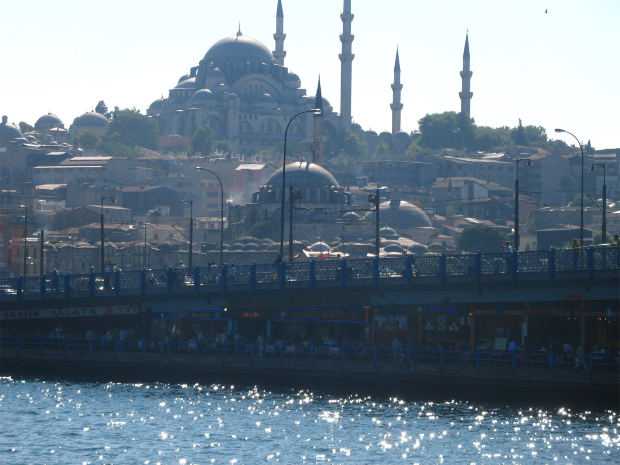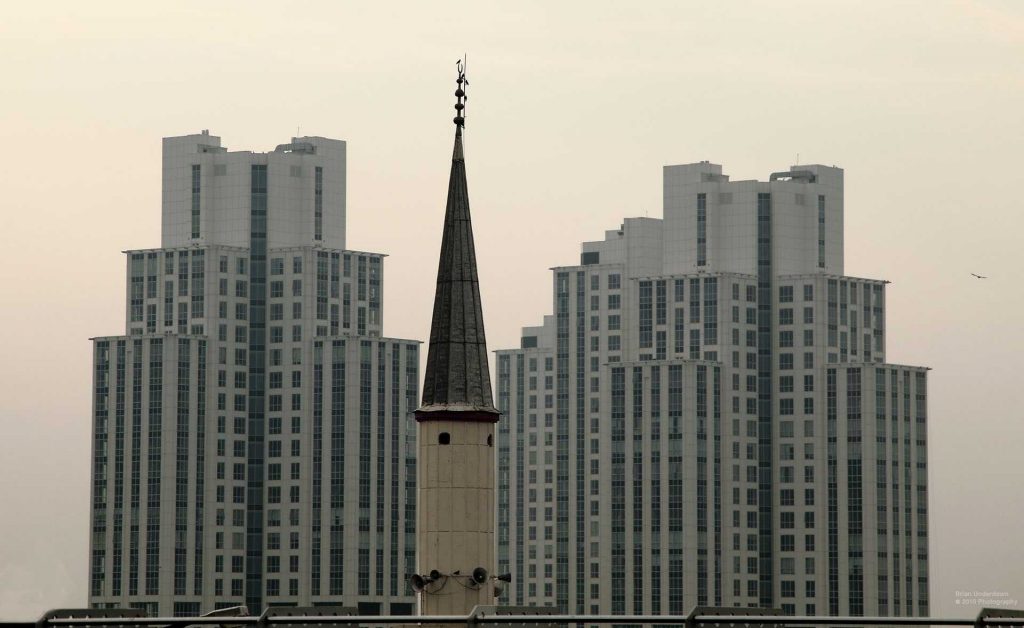The new ’moderate’ Turkey
By Robert Ellis, August 15 2008
Under AKP rule Turkey has become a Big Brother state where critical journalists risk arrest.
Since the AKP (Justice and Development Party) came to power in 2002, and especially in the last year, Turkey’s development has taken an Orwellian turn.
For the first three years things went well and the AKP government continued with the reform program embarked on by the previous coalition government. But since Turkey started accession negotiations with the European Union in October 2005, the zeal for reform has lost momentum.
Together with the reform packages aimed at opening the gate to the Promised Land, there was a parallel development designed to secure the AKP’s grip on Turkey. The preamble to the Turkish constitution establishes that “there shall be no interference whatsoever by sacred religious feelings in state affairs and politics” but this is exactly what the AKP has done.
In Sepember 2006 General Ilter Basbug, who has just been appointed Chief of Staff, warned of “intentional, patient and systematic attempts” to erode what the Turkish republic has achieved since it was founded in 1923. At the same time the higher echelons of the state administration and particularly inside education have been replaced with the party faithful. For example, last year 4,500 people were appointed as principals and deputy principals, two-thirds of whom were affiliated with the governing party.
God’s will
The year after the AKP came to power its parliamentary majority voted to appoint 15,000 new imams instead of a proposed 1,500 for the country’s more than 77,000 mosques. But the move was blocked by the International Monetary Fund, which as a condition for a $16 billion loan had limited the total number of new jobs in the health, education, police and religious services to 34,000 that year.
Another move which has pleased the AKP’s grass roots has been to ease the restrictions on Koran courses, which have since almost doubled. One consequence was the recent gas explosion in a ramshackle building in Konya province, where an illegal Koran course was being held. As a result, 18 young girls were killed but this was ascribed by the parents to God’s will.
The government has also increased quotas for enrollment at religious high schools by 66 percent, compared to only 8 percent for standard high schools, but the AKP has not yet succeeded in gaining admission to the universities for these students on an equal footing with the others.
The question of whether female university students should be allowed to wear the Islamic headscarf has been at the root of the clash between the government and secular supporters in Turkey. The AKP’s attempt in February to change the constitution to make this possible was annulled by the Constitutional Court, and at the end of July the party’s state subsidy was halved as a punishment for becoming “the center of acts against the principle of secularism”. However, there is no reason to believe that the AKP intends to deviate from its present course.
The AKP has also laid its hand on the Higher Education Board, whose chairman was appointed by the government in March. President Gül, the AKP’s former foreign minister, has just chosen 21 new university rectors from lists prepared by the Board, and consequently bypassed a number of candidates chosen by the universities. This has been considered as yet another blow to the universities’ autonomy and tit for tat for the refusal by many rectors to allow the Islamic headscarf.
Ergenekon
A clear indication of the AKP’s mindset is the proposal put forward by the party’s deputy chairperson, Edibe Sözen, with the intention of protecting Turkey’s youth.
This includes compulsory prayer rooms at all schools, a ban on entering Internet cafes for young people under 18 and the registration of anyone buying pornography.
Edibe Sözen claims there is similar legislation in Germany but because of a strong reaction from different groups in society the proposal has been withdrawn.
At the same time as the Constitutional Court deliberated over the future of the AKP, the government launched a counter-offensive in the form of the so-called Ergenekon case, where the public prosecutor has in a 2,500-page indictment charged 86 people with being members of a terrorist organization opposed to the government. This allegedly includes a number of critical journalists, including the 84-year-old editor of a secular daily, who was dragged out of his sickbed at four in the morning.
Turkey has just marked the 100th anniversary of the lifting of press censorship but this has also been overshadowed by the Ergenekon case. In this connection the Turkish Journalists Association issued a written statement, deploring that the number of journalists taken into custody for alleged claims that they disrupt the government is increasing.
The AKP government has tightened its grip on the Turkish media through the controversial sale of the Sabah-ATV media group to Calik Holding, which is owned by a close friend of Prime Minister Tayyip Erdogan, and where Tayyip Erdogan’s son-in-law is the general manager. The purchase sum of $1.1 billion was financed by two loans totalling $750 million from two state banks and the rest from a Qatar-based company. Moreover, KanalTurk, which was formerly anti-government, has been bought by an AKP associate.
An eery dimension is that Turkey is being transformed into a Big Brother society.
According to Soner Cagaptay from the Washington Institute for Near East Policy, Turkish journalists believe the AKP government has intercepted more than 1.5 million phone and email conversations involving its secular opponents. And Transport Minister Binali Yildirim has admitted: “It is not possible to prevent being listened to; the only way is not to talk [on the phone]. If there is nothing illegal in our actions, we should not be concerned about such things.”
An AKP deputy interviewed by The Economist claims Prime Minister Erdogan has become a tyrant and the editor of the Middle East Quarterly, Michael Rubin, has dubbed him “Turkey’s Putin”. Taking this into account, the question is how long Turkey can maintain its image as a spokesman for “moderate Islam”.
Robert Ellis is a frequent commentator on Turkish affairs in the Danish press and since 2005 also in Turkish Daily News. However, after a critical article on the AKP in the Los Angeles Times in March, he was informed by TDN’s editor he was ‘persona non grata’.






